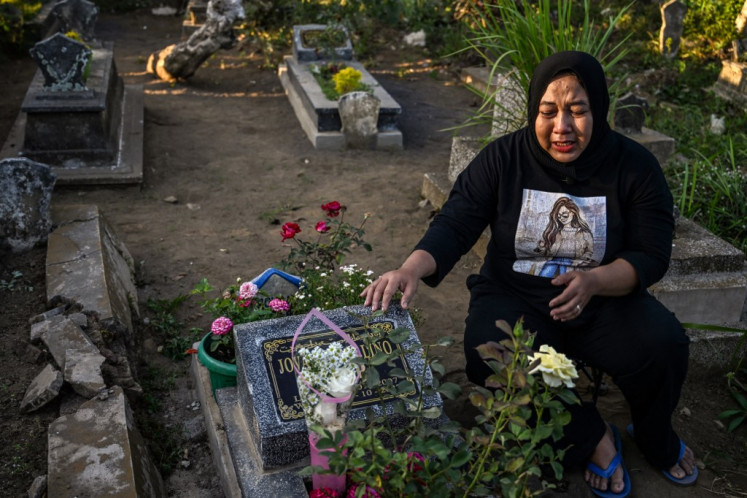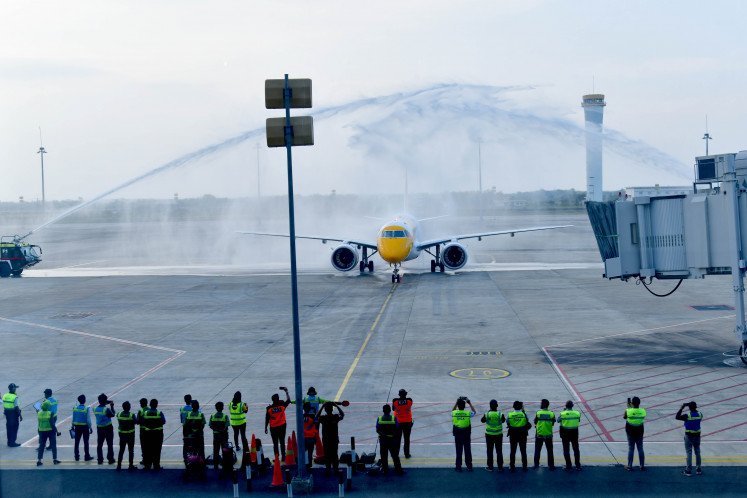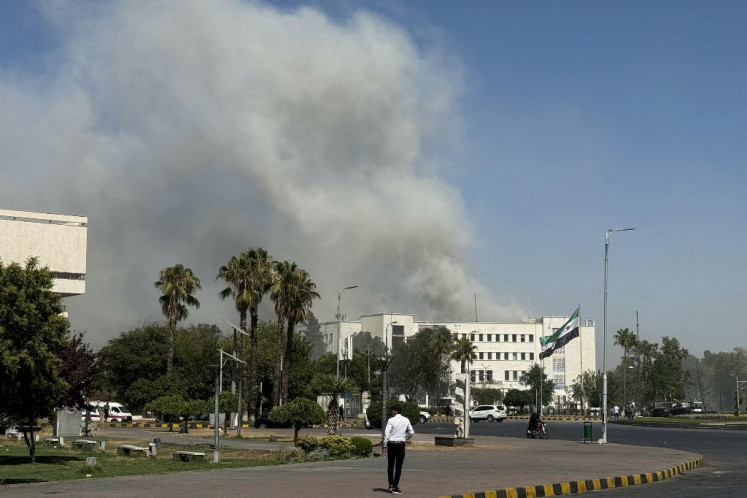Popular Reads
Top Results
Can't find what you're looking for?
View all search resultsPopular Reads
Top Results
Can't find what you're looking for?
View all search resultsScrap metal workers risk life and limb in Belah Kapal
Nerves of steel: Metal scrappers chop up parts of old ships on 2 hectares of open yard at the end of Belah Kapal alley, on the coast of Kalibaru in Cilincing, North Jakarta, on Friday
Change text size
Gift Premium Articles
to Anyone
N
erves of steel: Metal scrappers chop up parts of old ships on 2 hectares of open yard at the end of Belah Kapal alley, on the coast of Kalibaru in Cilincing, North Jakarta, on Friday. Accidents often occur as they swelter under the hot sun, ranging from blisters caused by the heat of the plates and cutting tools, stifled breathing from inhaling heavy smoke and flakes of rust, to severe abrasions from being hit by large iron plates.(JP/Budi Sutrisno)
A cacophony of metal bashing together filled the air along the shore of Kalibaru in Cilincing, North Jakarta, on a sweltering Friday morning.
With acetylene torches in their hands, dozens of workers cut parts off old ships in a 2-hectare yard located near an alley, fittingly named Belah Kapal (Ship Breaking).
“It’s a metal-recycling business. Ships that are aged 20 to 30 years or can no longer operate because of severe damage will be cut up on the water into car-sized plates, before being lifted ashore and chopped up into pieces measuring only 1 square meter,” said Dulatip, a foreman.
Dulatip and other workers risk life and limb scrapping ships. There is a lack of proper safety equipment to protect them from deadly toxins, exploding gases, falling steel plates or other dangers.
Most workers simply cover their faces with a rag to prevent them from inhaling thick smoke.
“When we cut parts of the ships that are filled with fuel, the fumes are heavy, which tightens our chests. We often ease this by drinking milk to remove the air impurities coming in,” said Ahmad Jaelani, a 33-year-old scrap metal worker.
“I’ve never witnessed anyone injured or killed, thank God. But there are always small accidents, we are used to them now. Fortunately, if an injury requires medical treatment, the company immediately helps,” he added.
Dulatip also acknowledged that accidents often occur.
“If we are tired and not so sharp, accidents ranging from blisters caused by the heat of the cutting torches, which often happen, to severe abrasions from being hit by a piece of steel, can easily occur,” he said.
For such risk-filled work, Jaelani and other workers only get Rp 150 (1 US cent) for every kilogram of steel they cut. Every worker is set a target of cutting at least 2 tons of old ship parts per day.
“It amounts to Rp 150,000 gross income per day,” he said. “Even though I work a full week, it’s just barely enough for my daily needs and to provide for my family,” he said.
When the shipbreaking is completed, steel plates weighing tens of kilograms are lifted by crane to be placed on trucks, swinging dangerously above the workers.
“The trucks will then carry the plates to smelting plants all around Greater Jakarta including in Balaraja, Tangerang, to be made into pipes, vehicle license plates and other metal objects, depending on the receiving factory’s production,” Dulatip said.
Scrap heap: The workers are not dissuaded by hazardous working conditions at a shipbreaking yard near Belah Kapal alley in Cilincing, North Jakarta.(JP/Budi Sutrisno)Jaelani and Dulatip are among around 100 shipbreakers working for PT. Bestindo Putra Perkasa, which was founded by a scrap metal trader named Haji Muchaji in 1980 under the name CV Victory.
“However, we are only casual laborers, not permanent employees. The consequence is that if there is no ship to scrap, we go home. Whenever we run out of work, we move somewhere else outside the city, even to different islands, and do the same work there,” said Dulatip.
The International Labor Organization lists shipbreaking as one of the most dangerous of occupations, with unacceptably high levels of fatalities, injuries and work-related illnesses. Shipbreaking is a highly polluting industry. Large amounts of carcinogens and toxic substances — such as mercury, lead,
isocyanates, sulfuric acid — not only poison workers but are also dumped into the soil and coastal waters.
The poor wages and hazardous working conditions, however, have not dissuaded people from working in the shipbreaking yard.
Jaelani noticed a more lucrative job outside Java Island, but he preferred to scrap old ships in Jakarta as it provided him more flexibility to visit his wife and three children in Tuban, East Java.
Another worker Saeli, 40, worked in different shipbreaking yards across the country before settling on Belah Kapal. He keeps on scrapping ships, although his right foot is permanently injured from a work accident in Surabaya, East Java, six years ago.
“After four years of recovery at home, I came back here even though I was still limping like this. Scrapping metals has always been my profession and the only opportunity that I have to earn money.”
The shipbreaking yard near Belah Kapal alley also provides a livelihood for women — mostly widows — who are given access by the company to scavenge metal residues on the ground.
Aminah, 58, sat under the sun with dried oil baked onto her wrinkled feet. In the previous eight days, she had filled five sacks of metal residue, weighing 100 kilograms each.
“Normally, we can get about 200 kg per day at best. But in hard times like this, we can only collect 10 kg, valued at Rp 100 to Rp 150 per kg,” said the mother-of-two.
Aminah became her family breadwinner after her husband Niahwan, who worked as a scrap metal worker, died four years ago. She has to juggle between scavenging and taking care of her 2-year-old grandson. Sometimes, her son helps to make ends meet by cutting up steel.
“My late husband used to be a scrap worker here as well. I remember that a year before he died, he had an accident here. One of the gas canisters exploded and injured his right thigh very badly. Luckily, the company the company bore full costs until he got better,” said Aminah.
Eko Suprianto, an administrative worker at Bestindo Putra Perkasa, said the company began recruiting local residents in 1995, when simple cutting tools were replaced with acetylene torches.
“That’s why the alley was named after the activity here because the company existed first before the houses were built,” said Eko.
“We are glad to be able to help empower the surrounding community and will continue to guarantee workers’ safety amid the hard work they put in every day.”











